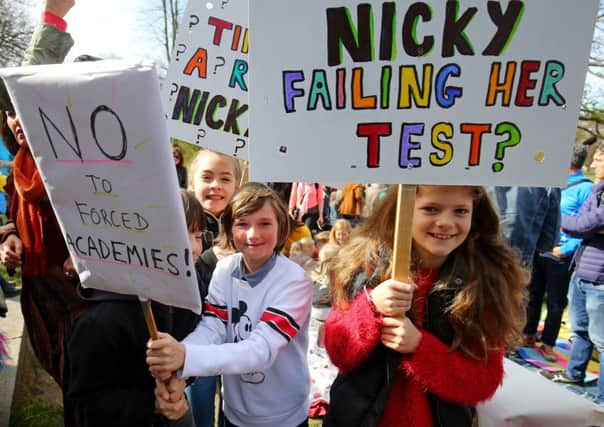Jayne Dowle: Tests don't pass standards required for our children


The tests, which replaced the old SATs, were based on a more demanding curriculum which has only been in place for two years. With only 53 per cent of pupils achieving the required standard in all three subjects – last year 80 per cent were successful – it’s fair to say that the move has been a failure from all angles.
We could expend hundreds of words on attempting to establish exactly why this is the case. I can only speak from personal experience as the mother of a Year Five pupil who is currently working her way towards them.
Advertisement
Hide AdAdvertisement
Hide AdFrom what I have seen of the system her school is using, in literacy in particular, children are being asked to understand, analyse and employ grammatical constructions which are beyond most adults. This includes me, someone who writes for a living. I don’t blame the teachers, who are clearly at the end of their collective tether. We’ve even had cases of head-teachers resigning over what they were being asked to do. I don’t even blame the Government.
Michael Gove had the best intentions when he set about attempting to raise educational standards and bring about a far more rigorous primary school curriculum in order to better prepare youngsters for secondary education. However, the way this has played out in the classroom is nothing short of a disaster.
It will do no-one any favours – least of all our children – to dwell on these results. What we must do is to come up with a clear way to move forward and help our children learn what they need to learn. Not for a minute am I suggesting that we screw up this new curriculum and start all over again. Our children have been the subject of far too many experiments already. Our teachers and support staff have had their professional reputations put under scrutiny like never before.
Let’s start by forgetting the nebulous idea of “achievement” for a minute, shall we? Far too much emphasis is placed on what individual pupils can achieve in comparison to their classmates. Every child in my daughter’s class knows exactly where they stand in comparison to the child who sits next to them.
Advertisement
Hide AdAdvertisement
Hide AdCan I ask those charged with improving the system to take this into consideration please? It has the potential to shatter the confidence of every child from those who struggle with school work to those who feel the pressure of being compelled to shine.
The tests themselves operate on a pass or fail basis, with the expected level set at 100. Scores can range between 80 and 120. Anything over 100 is a pass, and in effect, anything under that is a fail.
Unlike the previous system, this does not help to usefully “grade” a child’s learning. Rather, it marks them out. Frankly, I’d say most 11-year-olds are too young for this kind of judgment. That’s why the 11-plus was phased out in all but a few local authorities.
Stressed children will not perform to the best of their ability. If it was up to me, there wouldn’t be Year Six tests at all. I understand though that there has to be a way of assessing what children have learned.
Advertisement
Hide AdAdvertisement
Hide AdDare I suggest that rather than put youngsters under such pressure with a set of exams, an element of continuous assessment is introduced?
I have some sympathy for teachers here; their workload is high enough, without the added burden of ongoing marking during term-time. What is preferable though – that kind of stress, or the stress of attempting to prepare children for tests with almost-impossible odds?
I would also like those in charge of turning this catastrophe around to look at the curriculum itself. Not for a moment am I advocating yet another back-to-the-drawing-board volte face.
Rather, I’d like the Department for Education to consider just how useful and vital some of the more technical aspects of the syllabus are. There seems to be a distinct lack of joined-up thinking regarding primary and secondary education. We are sending children into Year Seven knowing more than those who are about to start their GCSEs. My son is just coming to the end of Year Nine, and he is baffled by some of the things his younger sister is expected to master.
Advertisement
Hide AdAdvertisement
Hide AdI’m the last person to argue for dumbing down, but what kind of trouble is this storing up for the children we are supposed to be preparing for the next stage of their education?
Let us hope that those who have the power to make a difference use the long summer holiday to come up with some solutions. Our children’s futures will depend more on the decisions these so-called experts take than on the results of any test.